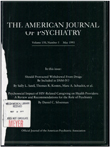Hypersomnia in bipolar depression: a comparison with narcolepsy using the multiple sleep latency test
Abstract
OBJECTIVE: This study characterized objectively the hypersomnia frequently seen in the depressed phase of bipolar affective disorder. On the basis of previous work in sleep and affective disorders, it has been hypothesized that the hypersomnia is related to greater REM sleep. This hypothesis was tested by using a multiple sleep latency test to compare bipolar affective disorder with narcolepsy, a well-defined primary sleep disorder associated with known REM sleep dysfunction. METHOD: Twenty-five bipolar depressed patients were selected on the basis of complaints of hypersomnia. They underwent 2 nights of polysomnography followed by a multiple sleep latency test. Data on their nocturnal sleep and daytime naps were compared with similar data on 23 nondepressed narcoleptic patients referred for sleep evaluation. RESULTS: Despite their complaints of hypersomnia, no abnormalities were noted for the bipolar group in the results from the multiple sleep latency test. Contrary to the working hypothesis, REM sleep was notably absent during daytime naps in the depressed patients, in marked contrast to the findings for the narcoleptic group. CONCLUSIONS: The complaint of sleepiness in the hypersomnic bipolar depressed patient appears to be related to the lack of interest, withdrawal, decreased energy, or psychomotor retardation inherent in the anergic depressed condition, rather than an increase in true sleep propensity or REM sleep propensity.
Access content
To read the fulltext, please use one of the options below to sign in or purchase access.- Personal login
- Institutional Login
- Sign in via OpenAthens
- Register for access
-
Please login/register if you wish to pair your device and check access availability.
Not a subscriber?
PsychiatryOnline subscription options offer access to the DSM-5 library, books, journals, CME, and patient resources. This all-in-one virtual library provides psychiatrists and mental health professionals with key resources for diagnosis, treatment, research, and professional development.
Need more help? PsychiatryOnline Customer Service may be reached by emailing [email protected] or by calling 800-368-5777 (in the U.S.) or 703-907-7322 (outside the U.S.).



